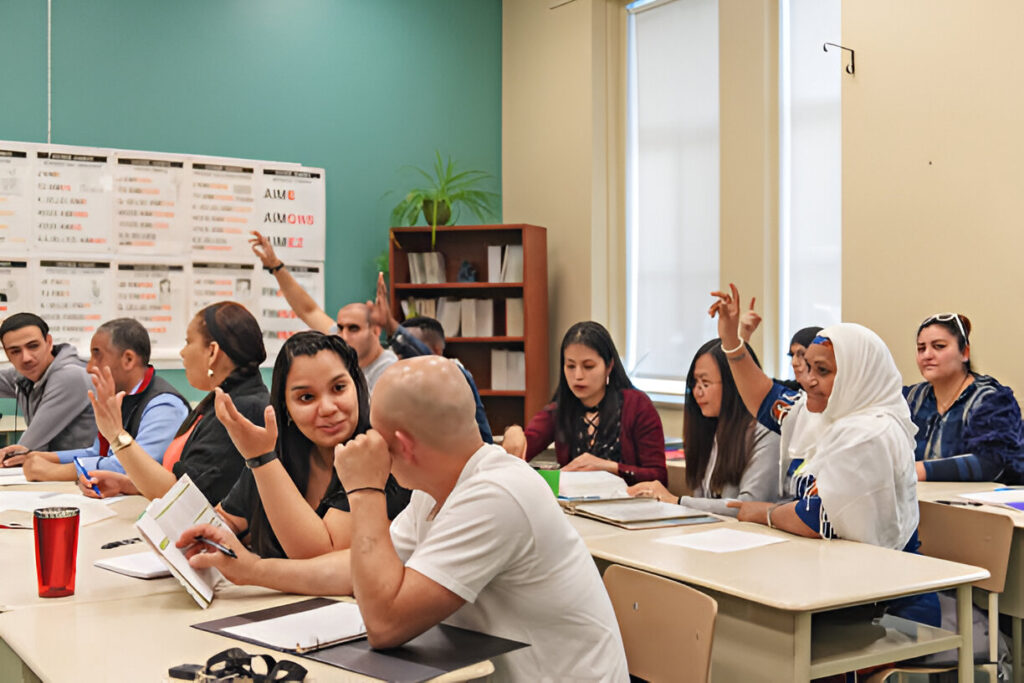Towards affective literacy for adult migrants: A systematic review
David Crespo, Universidad de Huelva
As global migration continues to rise, the challenge of language learning for adult migrants becomes increasingly significant. Learning the language of a new country is not just about survival, but about integration and belonging. Traditionally, literacy has been defined as the ability to read and write, which are essential skills for navigating daily life. However, literacy has evolved to encompass multiliteracies and multimodality, enabling learners to create meaning through various forms of communication, including oral, written, visual, digital, and multimodal (Cope & Kalantzis, 2023).
Beyond these forms of communication, emotional aspects such as cultural connection and diverse backgrounds play a crucial role in the literacy journey of migrants, as noted by Fonseca-Mora & Fernández Corbacho (2024). In the 1970s, there was a growing interest in affect in second language teaching, influenced by humanistic trends across multiple disciplines, including applied linguistics, psychology, education, sociology, and neuroscience. Similarly, literacy education has experienced a “turn to affect” (Anwarrudin, 2016), shifting the focus from academic and theoretical considerations to the importance of human emotions and how they relate to texts. This shift frames the concept of “affective literacy”, a transformative concept with the power to fully capture the personal experiences of adult migrants. That is why Toscano et al’s (2024) article focuses on how affective literacy can reshape the literacy landscape for adult migrants and enrich their journey towards integration and belonging.

The objective of the article was to identify studies related to “affective literacy” in adult migrant contexts, analyze its conceptualization, and explore research approaches and teaching practices. This systematic review gathered 16 studies from three databases (SCOPUS, WOS, and ERIC), following the PRISMA protocol.
Literacy courses have traditionally focused on teaching cognitive skills such as decoding and fluency. However, as Deleuze (1995) points out, personal growth and social integration in a new country are better supported by emotional themes. In this sense, ‘literacy is a tool for social change’ (Anwaruddin, 2016, p. 391) because it supports equity, diversity and inclusion – the so-called ‘turn to affect’. In light of Cole’s (2009) call for the need to evoke emotional responses to print, Toscano et al. (2024) define affective literacy as “the impact of reading on readers’ lives” (p. 392), involving not only written but also multimodal texts in which different elements of the reading process influence one another. The review underscores that affective literacy goes beyond traditional cognitive approaches by emphasizing emotional engagement and cultural diversity, promoting personal growth, social integration, and social change.
The study found that most research is conducted in highly literate places, often with participants who are not migrants. Moreover, there are few studies on adult migrants’ affective literacy, highlighting a gap in this area of adult education. Besides, most research on this topic is conducted in countries like the USA, Canada, and Australia, which have a long history of multiculturalism and multilingualism. This underscores the urgent need for more inclusive research that addresses the unique literacy challenges faced by adult migrants in diverse contexts.
In terms of teaching practices, to implement affective literacy in the language classroom, digital tools, literature, music, and humour can be used to create emotional connections. This approach helps students learn a language through sharing real-life experiences. According to Deleuze (1995), texts with affective themes are chosen to engage both teachers and students. This process focuses on personal histories and reflective dialogues, allowing learners to shape their identity while acquiring language skills.

Affective literacy is still in the early stages of being integrated into language teaching. However, the authors believe it can help teachers better support their students in the language learning process and in coping with the challenges of modern life. The lack of studies on affective literacy in this context is concerning, as sharing feelings is a crucial part of migrant education. Fonseca Mora (2024) argues that by including affective literacy in language teaching, teachers can ensure that adult migrants’ voices are heard and that they are included, thus avoiding marginalization. By embracing affective literacy, educators can play a pivotal role in helping migrants overcome barriers, achieve personal growth, and fully participate in their new communities.
This study is a result of the R+D+I project “Multiliteracies for adult at-risk learners of additional languages” (MultiLits), REF. PID2020-113460RB-I00 funded by MCIN/AEI/10.13039/501100011033.
An annex entitled “Affective Reading Literacy Review: Summary of findings” is available as a data set document in the institutional repository of the University of Huelva “Arias Montano”: https://hdl.handle.net/10272/24402.
References
Anwaruddin, S.M. (aka Ahmed, A). (2016). Why critical literacy should turn to ‘the affective turn’: Making a case for critical affective literacy. Discourse: Studies in the Cultural Politics of Education, 37(3), 381–396. Doi: https://doi.org/10.1080/01596306.2015.1042429.
Cole, D. (2009). Deleuzian affective literacy for teaching literature. A literary perspective on multiple literacies theory. In D. Masny and D.R. Cole (Eds.), Multiple literacies theory (pp. 63-78). Rotterdam: Sense Publishers. Doi: https://doi.org/10.1163/9789087909116_006.
Cope, B. and Kalantzis, M. (2023). Towards education justice: Multiliteracies revisited, in G. C. Zapata, M. Kalantzis & B. Cope., Multiliteracies in international educational contexts: Towards education justice. Routledge.
Deleuze, G. (1995). Negotiations 1972-1990 (M. Joughin, Trans.). New York: Columbia University Press.
Fonseca, M. C. (2024). Affective literacy in language teaching: the voice of adult migrants. Bellaterra Journal of Teaching & Learning Language & Literature, 17(4), e1406. https://doi.org/10.5565/rev/jtl3.1406
Fonseca-Mora, M.C. & Fernández-Corbacho, A. (2024). Foreign language learners’ socio-emotional skills: Belonging and connectedness in plurilingual education. In F. Channel- Davim, K. Gouache & K. Tretola (Coords.), Plurilinguisme et littéracie face à la diversité linguistique et Culturelle. Paris: Lambert Lucas.
Toscano-Fuentes, C., Fernández-Corbacho, A. & Fonseca-Mora, M.C. (2024). Towards affective literacy for adult migrants: A systematic literature review. Australian Journal of Adult Learning, 64(3), 376-400.
